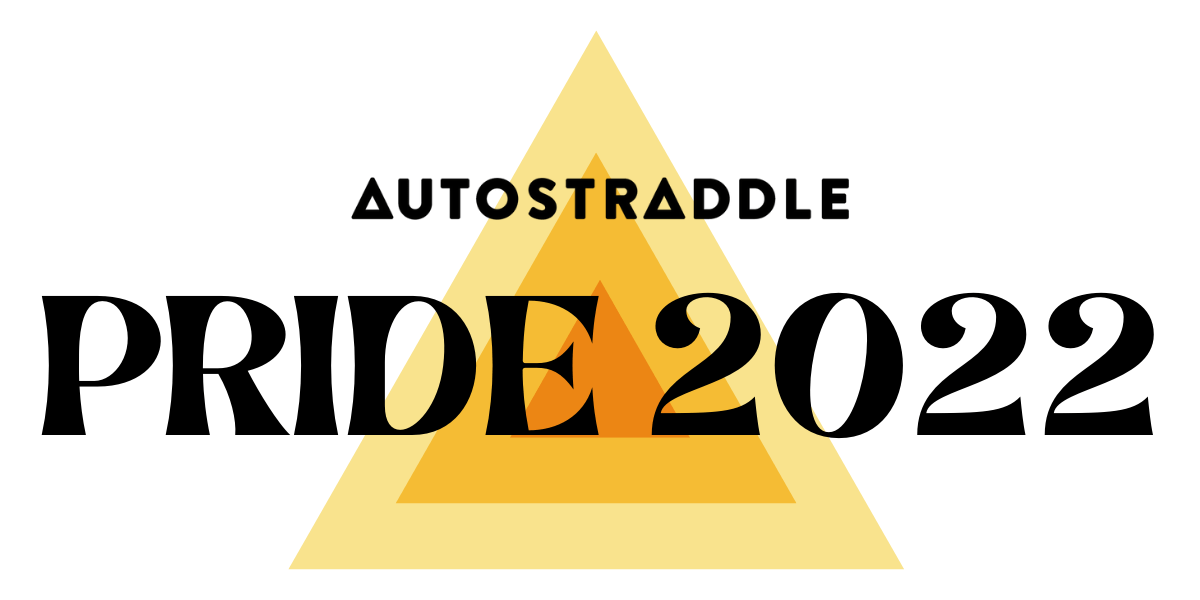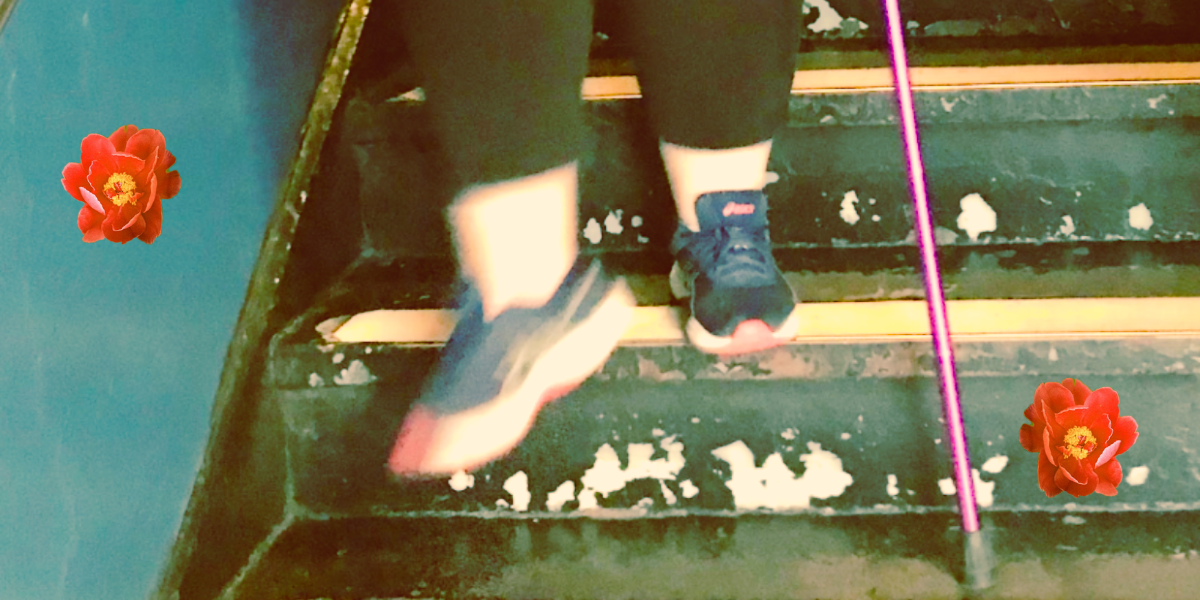feature art: Autostraddle

The most welcome and accepted I’ve ever felt in a queer space was outside Republican senate leader Mitch McConnell’s house.
It was one of the many times Republicans tried to overturn Obamacare. Local DC organizers threw a queer, disabled-centered dance party full of joy and biodegradable confetti outside of his house. A short march led by people using mobility devices set the pace for everyone else. There was space and intention to allow disabled folks space to move and participate in the dance party in ways that worked for them. The speakers were all disabled people who spoke about how overturning Obamacare would harm them. It wasn’t perfect, but it was the first time I saw disabled people centered at an LGBTQ-focused event, and it made me feel free and whole in a way I didn’t know was possible.
It was also probably the last time I saw disabled people even considered in an LGBTQ-focused space.
Most of the time, I need to choose between being disabled and being queer, even if, in reality, that’s not possible.
Over the years, I’ve had to learn to accept that Pride festivals are not suitable for my body. If I feel well enough to spend the day walking miles in 95-degree heat, I will pay for it with days or weeks of flares, joint pain, sun rashes, and flu-like fatigue.
Learning to accept and love myself as disabled has meant learning my body’s boundaries and being willing to advocate for them. For the last Pride I attended before the pandemic, I emailed the organizers weeks in advance to ask about disability accommodations. After a confusing series of emails with people who didn’t seem to have a clear plan for disability accommodations, I was eventually given directions to a tent in the middle of the parade route. I was allowed to bring one person into that tent with me. So while all my friends planned to party together, I had to tell them that my partner and I had to be by ourselves. Most roads were closed on the day of the parade. To get to the disability tent, I had to walk half the parade route. I found a few folding chairs under an awning, one folding chair per registered disabled person when I got there. The staff expected my partner to stand. So the one person I was allowed to bring with me couldn’t even sit with me, making me feel more isolated.
For another year’s Pride, a local LGBTQ organization gave away tickets to a concert. I won — only for them to tell me it was standing room only. I was in the middle of a bad flare-up and had been hibernating in my apartment for weeks. I was looking forward to a reason to leave and be around other queer folks. I asked the organization what I was supposed to do if I couldn’t stand up physically. They had no idea and hadn’t considered that possibility. I took it upon myself to contact the concert venue. After a few tries, they offered me two spots in a small blocked-off section of the venue. Still, I needed to hunt down a security guard, show them my ID, and ask them to let me back into this barricaded section each time I needed to leave and come back. Since my name was the one on the disabled list and not my partner, I had to be the one to show my ID. This policy made simple things extraordinarily difficult: I had to get a security guard every time I needed to pee or get some water.
Still, that was easy and accommodating compared to the standing room only Andrea Gibson show.
Andrea Gibson’s work has felt like a home for me, one where I don’t need to put down my disability and chronic illness to hold my queerness. Gibson is a non-binary spoken word artist with chronic Lyme disease whose work often expresses their experience of both queerness and chronic illness. That doesn’t mean the staff who work at the venues that host Gibson know a damn thing about disability. When I saw that an upcoming Gibson show would be standing room only, I contacted the theater to ask about disability accommodations before buying a ticket. I was worried tickets might sell out. So I copied my partner in the emails to the theater to increase the odds that one of us would be available to buy tickets once we had an answer. The venue strangely replied directly to my partner to ask questions about me, leaving me entirely out of the emails every time they responded. It was confusing, and I felt like I was being treated like a child.
It got worse. They asked my partner: “What’s the name of the person using ADA [Americans with Disabilities Act], can they climb stairs and are they in a wheelchair?” I should have said I couldn’t use the stairs, but I didn’t because I was trying to be friendly and easy to accommodate. It’s exhausting to spend what little energy I have on educating people about my disability to get access to a space others already have access to. Instead, I said: “I could probably slowly climb one flight of stairs, and I will bring my cane.”
On the day of the show, the staff expected me to go up two stairwells and sit on a backless high barstool. Backless barstools are terrible for most people with mobility issues. Some people may use them as short-term support for help with chores like bathing or dishes, but sitting in them for hours can be impossible. They are often tall enough that you need to climb to get on them. They require strong core muscles and mobility to hold yourself upright. There is no footrest for those who need it. Sitting on a backless barstool for more than ten minutes will worsen my joint pain. I had to argue with the staff about what it looks like to accommodate disabilities and why a backless barstool up two flights of stairs is not it. By the time the show started, I was exhausted and crying.

Then there was the day I got married to my partner in a small legal ceremony. We decided to go to a drag brunch to celebrate in a joyful queer way. A large, creaky, steep, old staircase greeted us when we arrived for our reservation. I climbed those stairs, and I ultimately had a wonderful time. Still, I sat at the bottom of those stairs for ten minutes in tears debating whether to scrap our celebration plans entirely or push through pain and fatigue. I wondered why it always seemed so difficult to exist in a queer space as a disabled person. I couldn’t just access the same places that my friends and community members loved. Why did something that was meant to be a source of joy and safety become a source of pain, fatigue, tears, frustration, and anger?
In queer spaces, I cannot be disabled. In disability spaces, people ask if my spouse is my sister. So instead, I often find myself alone on the sidelines, unwelcome by both of my communities.
I hope that someday I don’t have to choose. That the queer community will learn to embrace, center, and welcome disability and, ideally, join us in the fight for disability justice. Here is how you can help make this Pride season a little bit more accessible:
- Talk to disabled people in your community and ask what they need to make spaces accessible, but don’t rely on them to educate you about their disability.
- Take steps on your own to learn about disability justice and access needs, and support change.
- Be mindful of your language, learn about inclusive language, and work to remove ableist language
- Include accessibility information in any public materials about the event: a Facebook event page, ad, flyer, or ticket sales web page.
- Don’t assume that something easy for you is accessible to everyone.
- Don’t just think about physical access. Consider all aspects of the event experience: communication like sign language or assistive listening needs, access to food, drinks, bathrooms, signs and print materials, calm spaces for people with sensory needs, parking, transportation access, and chemical or lighting sensitivity.
- Consider that many disabled people are at high risk for COVID-19. Make masks and vaccines a part of your accessibility plan. For more tips on planning Pride events that are inclusive of and safe for your immunocompromised friends, check out Heather’s Pride piece.








Comments
Really appreciate this piece, thank you for writing it.
I love to see light being shed on the existence of people who are at intersection of both the queer & disabled community! It’s not something you really see or hear about at all but your lived experience is a very harsh reality for many people who occupy space in both communities. I spent a couple hours yesterday researching pride events in my city, sifting through things hoping to find something do-able. In the end I mostly felt overwhelmed and discouraged. I’m still holding out hope to find something low-key, fun AND accessible. Thank you for sharing the details of your experiences. It really resonates with me and makes me feel less alone.
Thank you 💟
This is so important, thank you for writing it.
Thank you for the labor it took to write this. Appreciate you and your work!
Yes! We really need more accessible spaces, there are no excuses for not offering normal seats
Thank you so much for this piece!
As a disabled queer person, this is exactly why I contemplated going to DC pride, then…. remembered all of this, and decided that no, I’ll stay home with my cats and have a couple of introvert friends over because in this pandemic, navigating these spaces went from difficult to *exhausting* to the degree that I just can’t imagine doing it.
Also, ironically, the last article I read before this in my feed reader was Disabled queer people increasingly feel Pride in themselves that was published in the Blade today.
I’m currently rehearsing (directing) a play celebrating the intersection of disability and queer identities – this essay really drove home the importance of my disabled and queer writer and actor sharing their story and our team’s drive for accessibility for our audience, thank you for writing it.
This looks great! Sadly I’m on the other side of the world :(
Thank you for this article.
Queer disabled spaces are so important! Thank you for this.
Brilliant, important piece. Thank you for writing.
OMG, I can so relate! Not only do queer disabled people have to contend with feeling welcome, or allowed, or accommodated in queer spaces, we also have to contend with the fact that our appearance and or mobility devices may make us completely unattractive and therefore lower on the social totem pole.
Katie I hear and feel every part of this <3 thank you for writing
I am sorry you can relate to so many frustrating things but appreciate you and your comment 💟
THANK YOU.
I. Feel. So. Seen. ❤️
💟
Thank you for the work and care you put into sharing your experiences with us here and for generously offering tips on how to make events more accessible. 💜💜💜